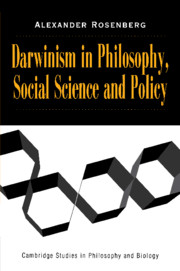Book contents
- Frontmatter
- Contents
- Introduction
- 1 A Field Guide to Recent Species of Naturalism
- 2 Naturalistic Epistemology for Eliminative Materialists
- 3 Limits to Biological Knowledge
- 4 Reductionism Redux: Computing the Embryo
- 5 What Happens to Genetics When Holism Runs Amok?
- 6 The Biological Justification of Ethics: A Best-Case Scenario
- 7 Moral Realism and Social Science
- 8 Contractarianism and the “Trolley” Problem
- 9 Does Evolutionary Theory Give Comfort or Inspiration to Economics?
- 10 The Political Philosophy of Biological Endowments: Some Considerations
- 11 Research Tactics and Economic Strategies: The Case of the Human Genome Project
- Bibliography
- Index
Introduction
Published online by Cambridge University Press: 06 July 2010
- Frontmatter
- Contents
- Introduction
- 1 A Field Guide to Recent Species of Naturalism
- 2 Naturalistic Epistemology for Eliminative Materialists
- 3 Limits to Biological Knowledge
- 4 Reductionism Redux: Computing the Embryo
- 5 What Happens to Genetics When Holism Runs Amok?
- 6 The Biological Justification of Ethics: A Best-Case Scenario
- 7 Moral Realism and Social Science
- 8 Contractarianism and the “Trolley” Problem
- 9 Does Evolutionary Theory Give Comfort or Inspiration to Economics?
- 10 The Political Philosophy of Biological Endowments: Some Considerations
- 11 Research Tactics and Economic Strategies: The Case of the Human Genome Project
- Bibliography
- Index
Summary
Following the model of The Origin of Species, the books I have written are each one long argument. The essays collected together and slightly revised here have not figured in any of these long arguments. But they do reflect a common theme: the implications of a broader naturalism and a more specific Darwinism for issues with which nonbiologists concern themselves. The oldest of them goes back only about ten years, and in each case I still find myself happy with their conclusions, if not altogether any longer satisfied with their expression and argument. Though written by a committed naturalist and one of Darwin's latter-day “bull dogs,” these papers give voice to the recognition that there are important limits to the power of these two inspirations to solve problems in philosophy, science and policy.
What is meant by ‘naturalism’ is something the first of these essays, “A Field Guide to Recent Species of Naturalism,” more fully recounts. But briefly, naturalism in latter-day philosophy is founded on a commitment, voiced initially by W. V. O. Quine, to let the sciences be our guides in epistemology and metaphysics. The renaissance in evolutionary biology and philosophers’ increased recognition of its relevance to human affairs have made a generation of naturalists into defenders and exponents of the theory of natural selection as naturalism's most informative guide. This is a conviction which I share. But I also recognize that naturalism leaves hostages to philosophical fortune: problems of justification that cannot be ignored. Detailing the structure of naturalism in the philosophy of science and how it deals with outstanding questions, especially of realism and antirealism, enables us to gauge its strengths and weaknesses.
- Type
- Chapter
- Information
- Publisher: Cambridge University PressPrint publication year: 2000
- 5
- Cited by

